All of our burning Overwatch questions have been answered
PC Gaming Week: Get oversaturated on Overwatch talk
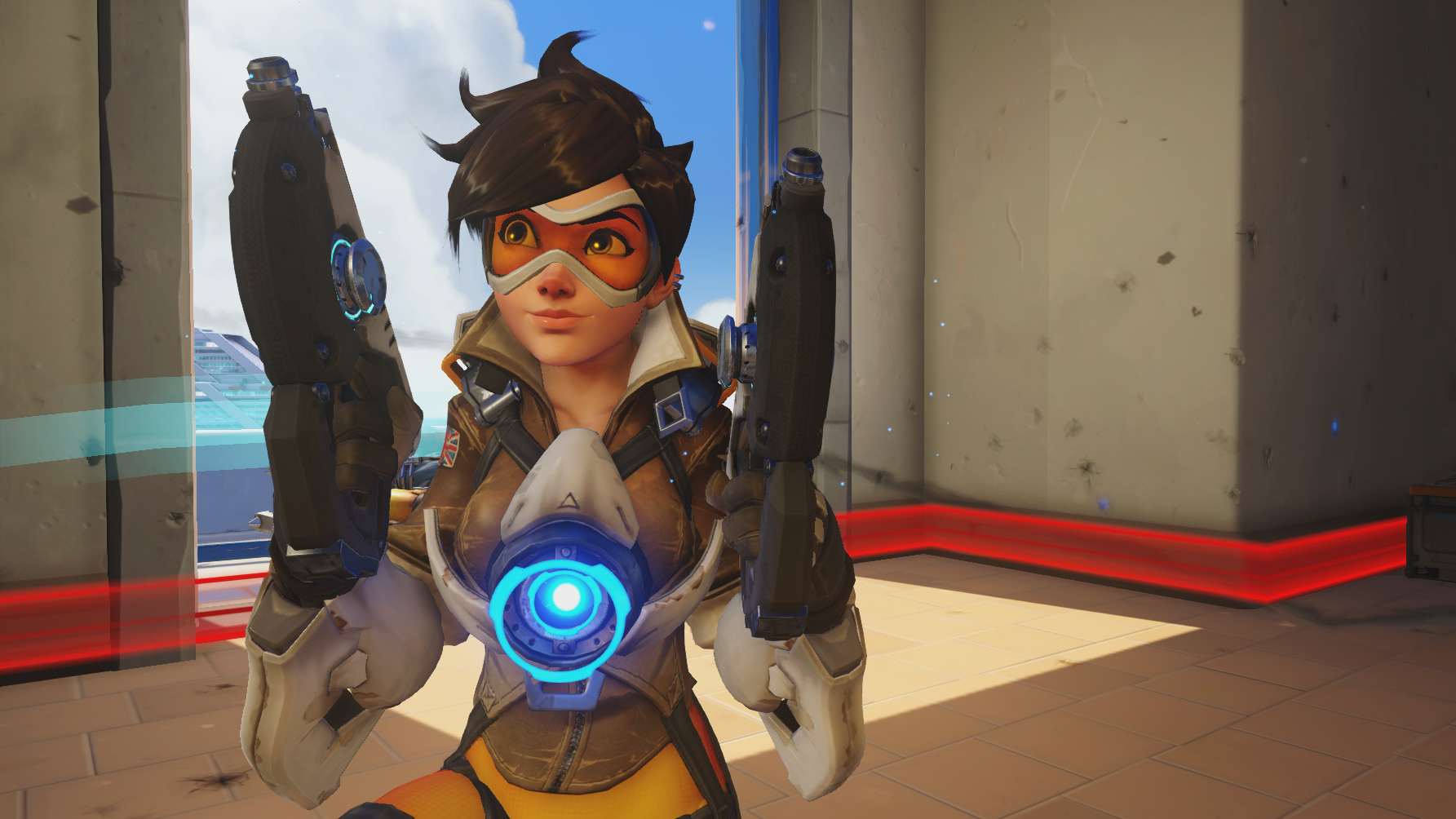
Sign up for breaking news, reviews, opinion, top tech deals, and more.
You are now subscribed
Your newsletter sign-up was successful
Blizzard Entertainment is one of PC gaming's stalwarts, responsible for the poster children of some of the most popular genres in the scene. World of Warcraft is to MMO games what Starcraft is to strategy games: the first place your mind goes to.
Now, the studio looks to make another game synonymous with a genre this month: Overwatch, technically Blizzard's first 100% original property in 20 years. Not to mention the studio's first shooter game to ever get into players' hands. (Set for release on May 24 for PC, Xbox One and PS4, it's also Blizzard's first game to release on three platforms at once.)
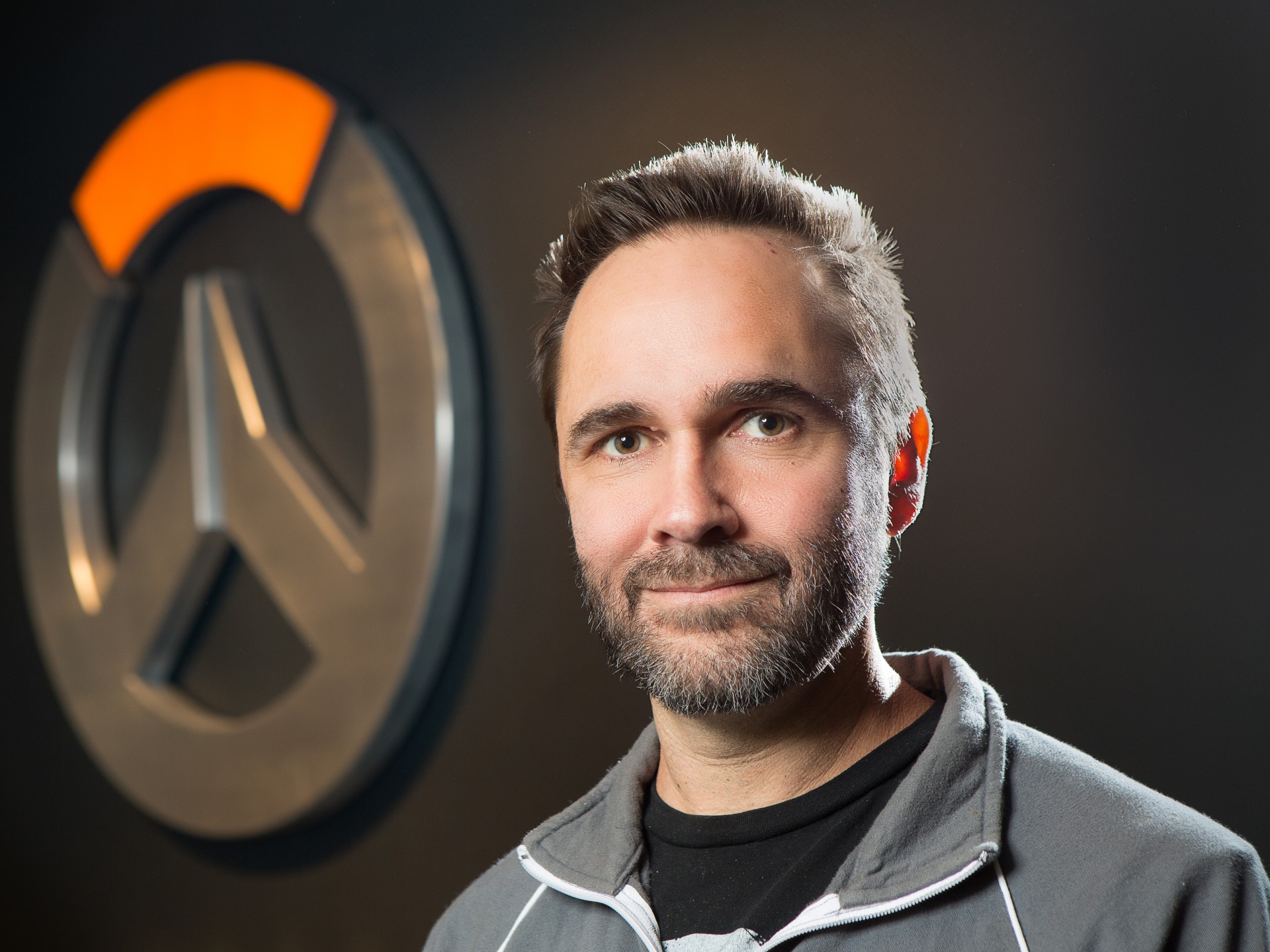
More specifically, the game exists in a bit of a new genre: team-based shooter, is what lead Overwatch team members are calling it. You know, games like Team Fortress 2 and more recent entries like Battleborn?
With Overwatch, Blizzard sits in a moment similar to just before it launched World of Warcraft back in 2004. Blizzard then entered a burgeoning genre only to dominate it to this day, albeit with more brand cache.
As I spoke recently with Overwatch assistant game director Aaron Keller (pictured), the sense of excitement and anticipation of making an enormous bet on a new type of game entirely – in true Blizzard fashion – was palpable. So much that almost every word Keller spoke was worth sharing in the edited transcript below.
If you had any questions about Overwatch or the thought processes or passion that went into this game before plunking down the $40 later this month, chances are Keller spoke to them throughout our lovely, 30-minute phone call.
Techradar: Knowing that this is a shooter and that Blizzard's pedigree is strategy and MMO, how did Blizzard account for that? Was it simply a matter of staffing up or something deeper?
Sign up for breaking news, reviews, opinion, top tech deals, and more.
Aaron Keller: There is a little bit of both. We did make a lot of key hires for this game. We made some hires on the console side, and we also made some hires of some people that have a lot of FPS background, especially on the engineering side.
It can get really complicated on the net code side of things with things like hit detection, so I think that we made some great hires.
But, at the same time, typically we make games that we're very passionate about. Jeff Kaplan, the game director, used to maps for mods for the original Team Fortress or Half-life. It's a genre that we're all passionate about, and we were able to bring that passion to bear in making Overwatch.
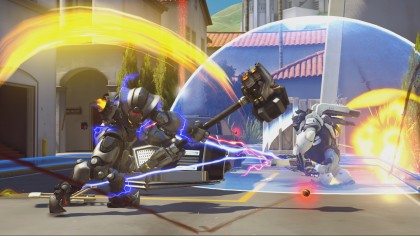
How is Blizzard approaching the fact it's entering the team multiplayer shooter scene long into its lifespan?
When we first started working on the game, we weren't really thinking about what the competition might be for it. We really just wanted to make the very best team-based shooter that we could.
Keller: I think that the game could make for a really great eSport. It's a ton of fun to watch and there's a lot of depth to it.
What really drove some of our passion and what makes the game so unique is the big roster of heroes. We have over 21 heroes that you can play, and they all have really unique, over-the-top abilities and they all fit a wide variety of play styles.
There are a lot of tactical and strategic decisions that a player and their team needs to make in order to be competitive. We started with the idea of, 'Let's make the best team-based shooter that we can,' and it turned into, 'Let's make a great competitive game.'
What are you thinking of in terms of eSports applications for Overwatch?
I think that the game could make for a really great eSport. It's a ton of fun to watch and there's a lot of depth to it. We've got a lot of plans to turn it into something big and something great.
We're just in the middle of finalizing all of that. We're just not quite ready to talk about it.
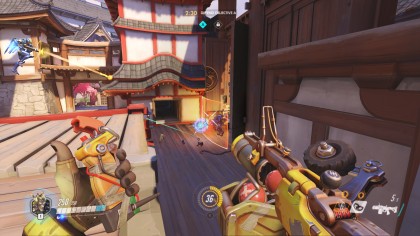
What are some of the most valuable things you've learned from the most recent closed beta? How about the even more recent open beta?
Keller: A well-coordinated team has the ability on the offensive side to push really well
We have a different set of values and motivations for a closed beta than we do for an open beta. For open beta, we're so concerned about server stability and reducing latency in the game. This is an online first-person shooter – if there's any lag in the game, it would be pretty terrible. That's really what we're focusing on right now [in the open beta].
Before, in the closed beta, so much of it was on the balance of the game and how the different heroes and maps that we introduced played.
Being sat squarely in the middle of two game genres, what kind of challenges has that presented in terms of balance and mechanics?
Just the addition of Ults [each character's Ultimate ability] presented a variety of design challenges for the game. When you get a team that coordinates really well and communicates really well, they can time their Ultimates and sometimes combo their Ultimates to great effect.
A well-coordinated team has the ability on the offensive side to push really well. It's something that we had to spend of time playing the game, collecting data from the beta and actually from watching a lot of the competitive games that have been going on daily since we started beta – to figure out how we were going to balance the game just around that one Ultimate ability.
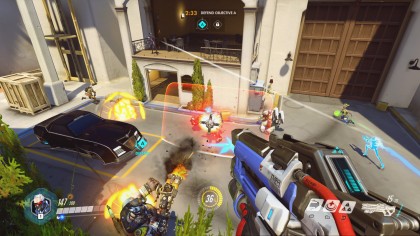
But, I'm also interested in the mechanics of the game, e.g., if I can score head shots for days, what does it matter that the enemy has a special power?
We have Widowmaker that you mentioned, she's our pure sniper class. Her Ultimate ability actually gives her wall hacks, so you can see the enemy team running around the map. That can be powerful not just for you but the rest of your team.
But, there are heroes that can cause her a lot of problems. We have a hero called Reinhart, he's the biggest hero in the game. He looks like a modern, medieval knight and he swings this giant rocket hammer. But another of his abilities is that he can place a barrier in front of himself, and the thing is pretty massive – probably 10 meters across.
The enemy team's projectiles hit it, but friendly players can shoot through Reinhart's shield, so if there's a Widowmaker giving you problems, you could use somebody like Reinhart and take cover behind him. You could put one of your own Widowmakers behind the shield and she can have free shots on the enemy team.
A lot of the magic of the game is in how a team can get built with all of the different heroes in order to either push an objective or to counter what the enemy team has thrown in front of you.
It seems that a lot of players' enjoyment of the game depends not only on their ability to coordinate within the game, but beforehand. What has been done to account for that in an environment where perhaps folks aren't on a chat client while playing Overwatch or using your own tools for voice chat?
We're excited to be the first Blizzard game to actually integrate voice chat, and it definitely helps to communicate with your team. Communicating and coordinating with your team is one of the biggest things you can do to have success in the game.
There's obviously just a regular chat system in game – you could just use your keyboard. When you're selecting heroes at the beginning of the game, we have hints up on the screen to try and encourage players to put together a well-rounded team composition.
On the other side, when you first starting playing the game, you might not even know who the right hero is to play all the time. So, you could always look at the hints, but we also have a matchmaker in place that will pitch you against other players that have a similar level of experience.
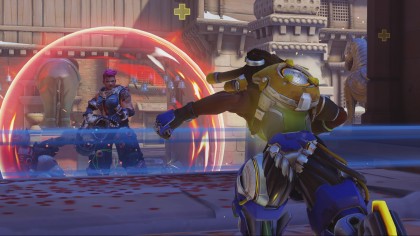
How does that matchmaking system work in Overwatch? Is it simply a matter of time spent, or does it go any deeper than that?
Keller: We purposefully took some statistics out of the game in order to encourage players to play together better as a team.
We try to match players of the same skill with each other, and there is a ton of engineering work that goes into deciding how skilled a player is.
It's actually all technical and I don't have all of the details for it because a little of it is over my head.
So, the game is actually tracking your decision making and movements and creating a profile for your account and leveraging that in the system?
Exactly. There's an internal rating that we use to match players against each other.
Have you had thoughts about publishing that rating for players?
We do make a lot of the different stats public. In game, there's a career profile that is pretty powerful. You can sort by hero to see which heroes you win the most with or which heroes you have the most kills with.
We typically go away from things like kill-death ratio, and the reason isn't because we're trying to save the players from feeling bad. But, what we noticed during development is that, when you did include things like that, players would start playing toward statistics more than they would toward winning the game.
We purposefully took some statistics out of the game in order to encourage players to play together better as a team.
That's not a light decision to make.
No, it definitely was not.
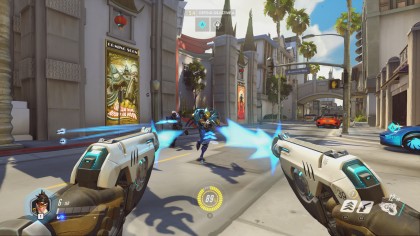
Being the first Blizzard game to release on PC and consoles on the same day at launch, what challenges has that presented the team?
It was a huge cost to our engineering team – they worked a lot of late nights. We like to keep the teams as small as possible, but I think that we ended up asking a lot out of the engine and console programmers and they were absolutely amazing in what they were able to deliver.
It ended up being so much work to do that.
Are there any sorts of differences that players could suss out between the console and PC versions of the game?
There's a little bit! An interesting difference between the console and PC versions of the game is that we use something called Dynamic Render Scale.
Keller: We actually even anticipated doing tuning changes between the PC and console builds of the game. Weird thing so far, though, is that we haven't had to make any tuning changes between the two.
The console versions of the game run at 1080p, but if you ever hit a moment where there is a ton of stuff going on on-screen, behind the scenes it will render at a lower resolution in order to keep the game running at 60 frames per second.
Because it's such a fast-paced game and every frame matters, we decided early on that one of our prime values for the game – not just for PC but for console – was for it to always be running at 60 fps.
You'll see it [Dynamic Render Scale] sometimes.
If a team wanted to, they could pick 12 Pharah's, they could all launch her Ultimate ability, Rocket Barrage – it just launches, like, 50 rockets from each of them – you could do all that in the middle of screen.
Very few computers on Earth can handle something like that, so we integrated like this so that we could keep even moments like that as smooth as possible.

Since you're running betas on both consoles and PC, what differences in player behavior are you anticipating between the two?
The things that I'd be really interested in seeing? I'd be interested in seeing how it affects which heroes get picked. We collect a lot of stats from the beta, and our stats team is amazing.
We'll get updates during the day, as matches are happening, so I would love to see whether heroes have the same win ratio and win ratings between the PC and console. I'd love to see how it affects popularity between the two – it would be really valuable for us.
We've always anticipated that there would be differences. We actually even anticipated doing tuning changes between the PC and console builds of the game. Weird thing so far, though, is that we haven't had to make any tuning changes between the two.
If we have to in the future, we're obviously open to it. The thing that gets me about the whole game in general is that it plays pretty different between low-skill and high-skill players. I'm kind of expecting that to translate onto the console versions of the game, too.
I'm not as good of a console player as I am a PC player, so the game actually does play different to me on the console from the PC. But, I think a lot of that has to do with my skill at the controller rather than the game actually playing differently. For a lot of people, I think the game is going to play almost identically across all the platforms.
I know that's already been said that Overwatch would not be cross-platform because of the advantage the PC players would have over console. But, now that we've had both Sony and Microsoft come out and say, "We're down with cross-platform play … we just have to wait for the other guy to say yes," with the Rocket League makers in the middle, does that change anything about what you think of cross-platform play?
While Overwatch won't launch with cross-platform play, obviously, I think it's a really cool idea. But, as a team, we're just in sort of a wait-and-see pattern.
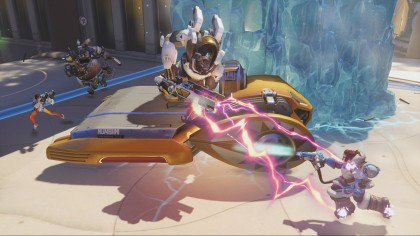
So, just spitballing, to account for the PC's homefield advantage, I immediately think of games like Mario Kart. Online players in Mario Kart that consistently use the Wii Wheel are clearly marked. Do you think that a similar system could work for Overwatch?
It's an interesting idea, but I have two comments on it. Right now, if you wanted you could plug your controller into a PC and play that way if you'd like to. But, on the other side, as far as console players against PC players, we feel like they are at a disadvantage.
You also have to remember that this is a team-based game, and so you could have other PC players on your team as you're playing with a console controller. And, those players might not be as enthusiastic about you playing with a console controller as you are. (Laughs.)
Right, that's actually a good point. [Editor's Note: that's me done playing game designer.]
So, every game that Blizzard creates has such a focus on the world and mythos in which it exists. Beyond the stellar cinematic shorts that have been published, where does establishing the world of Overwatch go from here?
You've seen us release a few digital shorts. We have two digital comics out. You can expect to see more of those in the future. We also plan on making a graphic novel as well – a longer format than the digital comics.
Then, I just hope that we can continue growing the game and growing the universe with stories like that. At Blizzard, we're all kind of world builders at heart – a lot us came over from the World of Warcraft team, and we can't help but over-design a lot of our spaces on the story side of it.
If you go into any of the maps, like Volskaya Industries, it's this map set in Russia somewhere and we have the rest of the city out there. And, there's this big story that's happening with this city and this big factory that's building these mechs in order to combat this big invasion by killer AI robots, you know?
We have so many things that we want people to end up thinking about and hoping for. So, we plan on developing this story and this universe for a long time, and I think we've got a lot of really cool ideas and cool things coming players' way.
When you think about how we can communicate story in this game, while the game is happening, you've got a couple voice lines that players say to each other, you have some of their emotes and then you've got a few things that happen at the end of a game.
We put a ton of time into making sure those are polished as possible and to convey as much personality into the heroes as we can, and I feel like players have gotten it. I think players understand what a lot of the heroes are about and what makes them tick. I'm excited to see where it keeps going in the future.
- These are the best PC games you can play right now

Joe Osborne is the Senior Technology Editor at Insider Inc. His role is to leads the technology coverage team for the Business Insider Shopping team, facilitating expert reviews, comprehensive buying guides, snap deals news and more. Previously, Joe was TechRadar's US computing editor, leading reviews of everything from gaming PCs to internal components and accessories. In his spare time, Joe is a renowned Dungeons and Dragons dungeon master – and arguably the nicest man in tech.